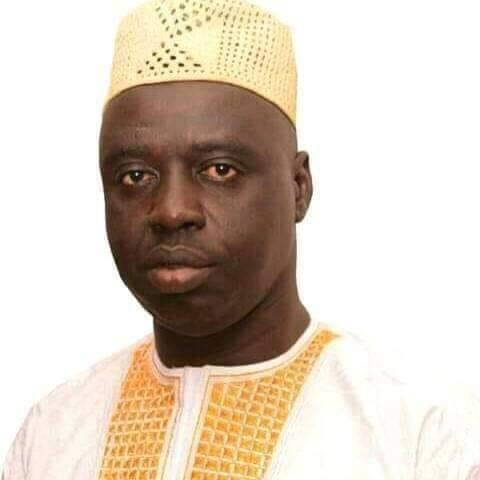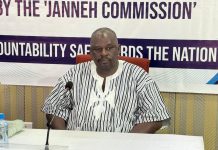By Yankuba Jallow
The Local Government Commission of Inquiry has placed former Basse Area Council Chairman Foday Danjo at the center of a deepening financial scandal, confronting him with evidence of an unlawful loan from the former Minister James Furmous Gomez and the diversion of two million dalasis in project funds, transactions the inquiry says bear the hallmarks of fraud.
Appearing before the Commission of Inquiry via video link on August 12, 2025, former Basse Area Council Chairman Foday Danjo faced sustained questioning over large-scale withdrawals from council accounts during his five-year tenure. The Commission is examining allegations that more than 51 million dalasis were withdrawn without proper oversight between 2018 and 2023.
The former Basse Area Council Chairman, Mr Danjo, who appeared virtually from the United States, where he now works as a state employee in a health facility. Under questioning from Lead Counsel Patrick Gomez, Mr. Danjo acknowledged that as chairman, “I am not involved in signing any of these cheques,” but conceded that the Local Government Act 2002 tasked him with supervising “the general administration of council.” He described near-daily meetings with the CEO, finance director, and development officer, but admitted, “At that time we did not have any threshold” for expenditures requiring chairman approval. Counsel Gomez said, “By law, you failed. The law said you must do it. You didn’t do it.” Gomez explained the three stages of approval provided by law that the CEO can approve up to a certain amount and any amount above that should be taken to the chairman of the area council to approve. Any amount above the threshold of the chairman, it should go to the council for approval. Danjo agreed that it is the provision of the law, but there was no thresholds at the Basse Area Council that they followed.
When presented with the figure D51.1 withdrawn by Finance Director Lamin Suso and his team, Mr. Danjo said, “I came to know that figure after the system audit.” He maintained that “the monies that I knew were withdrawn were put into projects,” but acknowledged agreeing to divert funds “based on the conditions” such as “paying salaries and the loan of Furu Gomez.” He also conceded, “Yes, I accept that I failed. There wasn’t any threshold.”
The Commission pressed him on whether the funds had been accounted for, citing evidence that withdrawals included cash payments to senior officials and deposits into personal accounts. “One can reasonably conclude that it is a suspicious fraudulent transaction,” counsel told him. Mr. Danjo replied, “I agree with what you have said because if the expenditure has no documents, that will back it. I will agree with you that it is suspicious.”
The testimony further revealed that the council took a loan from the late Furu Gomez without ministerial approval, contrary to the Local Government Finance and Audit Act 2004. Mr. Danjo admitted, “Yes, I agree” that it was wrong. The council also used the subvention from the government to repay the loan. Danjo said the decision was wrong as it was contrary to law.
The Commission of Inquiry also heard testimony from the witness, Mr Danjo, who outlined his tenure as chairman from May 2018 to 2023, his education at Koba Kunda Primary School, St. George’s Secondary Technical School, and the Management Development Institute, and his role in the appointment of nominated councillors. The 6-page statement of the witness dated 7 November 2023.
During his five years in office, Mr. Danjo said he worked with “fourteen elected councillors and five nominated councillors.” He named the nominated members as Mariama Trawally- woman rep, Musa Sow – rep for persons with disability, Nafaa Jabai – youth representative and Sana Drammeh – business rep, later suggesting the number might have been higher. The appointments of the nominated councillors, he testified, followed a process where “we informed the youths for them to nominate or select anybody they felt to nominate, then we did the same thing to the women group, the business community and the persons with disability.” Mr. Danjo acknowledged that these notifications were given verbally before the council was sworn in, adding, “It was not written. We spoke to their chairman to go back to the committees and select representatives.”
Pressed on whether the Minister was informed, Mr. Danjo admitted, “We did not inform the minister… Yes, I accept.” Counsel Gomez pointed out that under the Local Government Act 2002, nominated members must be appointed “with the concurrence of the Secretary of State or the Minister,” a requirement not followed in this case. Mr. Danjo accepted that “those appointments were invalid” and said, “Yes, I will agree.”
He attributed his approach to guidance from the council’s Chief Executive Officer, saying, “As far as we came newly and he was there before us for a long, quiet time, well, I think he needed to guide us for us to know exactly what is the procedure or not.” Counsel responded that responsibilities under the law were the chairman’s alone: “The presumption is you were competent enough to be a chairman. You must follow the law.”
The Commission focused on the council’s decision to take a loan from the late former minister James Furmous Gomez, the diversion of development funds, and a series of unexplained transactions. Lead Counsel Patrick Gomez read aloud Section 14 of the Act, which states that a council “may, with the prior approval of the Secretary of State, raise loans.” Mr. Danjo was asked whether he agreed that the law required such approval before contracting a loan. “No, I know it is not within the act,” he admitted when told there was no provision allowing loans from individuals. Asked directly whether taking the loan was wrong, he replied, “Yes, I agree.”
The Commission also challenged him on the use of subvention funds to repay the debt. “Yes, I was asked and I said yes, that is not correct,” he conceded. He explained that the council diverted the money “based on the conditions on the ground at that point in time” to pay salaries and the loan, adding, “It was diverted for a purpose.”
Evidence before the Commission showed that part of the diverted money was handled in ways the inquiry deemed improper. Counsel cited records that “$150,000 was various payments carried out by Director Suso” without supporting documents, an $800,000 withdrawal from Trust Bank in which $765,000 was moved to Vista Bank, and “$25,000… spent sponsoring a student… Fatoumata Jawara,” with $10,000 still unreconciled. Mr. Danjo confirmed, “I can remember that Director Suso gave me the sum of $65,000 and $20,000 and $10,000 in separate instances and authorized me to deposit the funds in his Alatento account.”
When asked if he was surprised by how the money had been spent, Mr. Danjo said, “Yes, I heard it from the Commission when the Commission said that I got all this information from the Commission.” He acknowledged from the outset that “the purpose it was given to us, we did not use the same purpose,” saying the intention was to restore the funds later.
Counsel then told him, “One can reasonably conclude that it is a suspicious fraudulent transaction,” referring to withdrawals and payments to the CEO and finance director without retirement or evidence. Mr. Danjo responded, “I agree with what you have said… if the expenditure has no documents that will back it… I will agree with you that it is suspicious.”
The Commission repeatedly warned that if an official knows they “will have a difficult time to account for monies, do not spend it.” Mr. Danjo admitted he did not request a statement of expenditure from the finance director or CEO for the money spent in 2021, saying, “That is not the case.”
In closing, he reaffirmed that the diversion of the 2 million dalasis in project funds was deliberate, though he insisted it was “for salaries and the loan of Furu Mendy [ex-minister].” Counsel told him the evidence suggested the money “was embezzled.” Mr. Danjo replied, “I agree with what you have said,” while maintaining that the council’s stated reason for the diversion was tied to pressing financial needs at the time.
The hearing ended with the Commission instructing Mr. Danjo to prioritize attending the next session to conclude his testimony, telling him, “You have to prioritize. You do not have a choice in this. You just inform your boss that you are giving evidence.”



















